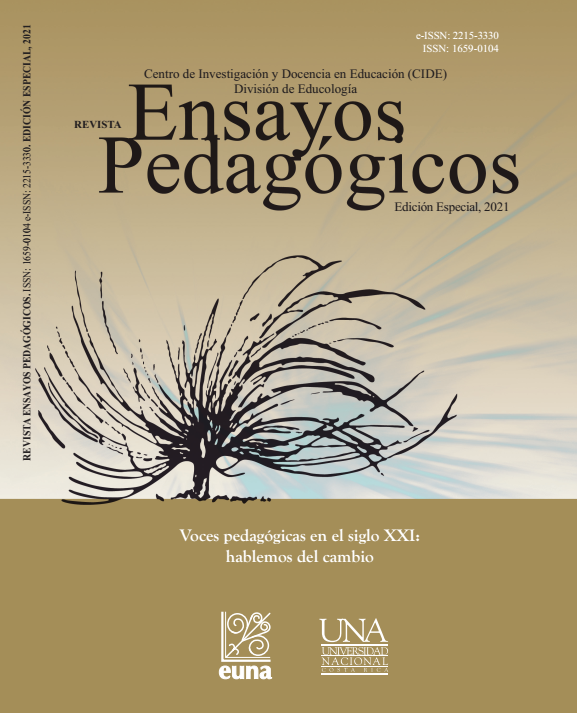Porfolios of Evidences for Contextualized Learning and Formative Assessment in Computer Engineering: Experiences in the Course of Algorithm Analysis
DOI:
https://doi.org/10.15359/rep.esp-21.3Keywords:
engineering, computer science, portfolios, formative assessment, contextualized learningAbstract
The course Analysis of Algorithms from the major in Computer Science at TEC is fundamental part of the academic preparation of professionals in the areas of software engineering or computer science. I also has a strong mathematical component that differentiates it from other courses that are more focused on programming. Based on these characteristics, three questions to improve the course were formulated: How can meaningful, permanent learning of contents be fostered?, How can these instances of learning be placed in a context that allows applying them for society’s improvement and well-being?, and How can a more fair and more formative assessment process be attained? Thus, a methodology of pedagogical mediation focused on portfolios is proposed. The effects of applying this methodology in the course during two semesters was analyzed qualitatively from observations and students’ reflexions. The findings point to an improvement in students’ grades and deepening in the contents studied thanks to the opportunity and motivation to inquire, learn by doing, and reflect on one’s own learning.
References
Álvarez, J. M. (2011). Evaluar para conocer, examinar para excluir. Ediciones Morata.
Barragán, R. (2005). El portafolio, metodología de evaluación y aprendizaje de cara al nuevo Espacio Europeo de Educación Superior. Una experiencia práctica en la Universidad de Sevilla. Revista Latinoamericana de Tecnología Educativa, 4(1), 121-139.
Barahona, M. (2013). Hacia una caracterización del engaño en el contexto de la teoría de dinámica de tropas. Káñina, 1(37), 155-166.
Castells, M. (2002). La era de la información: La sociedad red (Vol. 2). Siglo XXI.
Cain, A., Woodward y C. J. (2013). Examining Student Reflections from a Constructively Aligned Introductory Programming Unit. En A. Carbone y J. Whalley (Eds.), Proceedings of the Fifteenth Australasian Computing Education Conference (ACE2013), Adelaide, Australia (pp 127-136). Australian Computer Society.
De Sousa, B. (2014) Epistemologías del Sur (Perspectivas). Ediciones AKAL.
De Souza, J. (2006). Transferir tecnología para establecer hegemonía: La ‘dicotomía superior-inferior’ en la ‘idea de desarrollo’ de la agricultura tropical desde 1492. En M. Yapu (Ed.), Modernidad y pensamiento descolonizador: Memorias del Seminario Internacional (pp. 180-220). Universidad para la Investigación Estratégica en Bolivia (U-PIEB).
Dussel, E. (2015). Filosofías del Sur: Descolonización y transmodernidad. AKAL.
Escuela de Computación. (2013). Programa del curso IC-3002 Análisis de algoritmos. Escuela de Computación, Carrera de Ingeniería en Computación, plan 410.
Fiori, E. M. (2005). Aprender a decir su palabra. En P. Freire, Pedagogía del oprimido (pp. 11-27). Siglo XXI.
Freire, P. (2005). Pedagogía del oprimido. Siglo XXI.
Freire, P. (2017). Política e Educação. Paz y Terra.
IEEE Computer Society (s. f.). About the IEEE Computer Society. https://www.computer.org/web/about/
Horkheimer, M. (1947). Eclipse of Reason. Oxford University Press.
Jara, O. (2014). La sistematización de experiencias, práctica y teoría para otros mundos posibles. CEAAL.
Klenowski, V. (2014). Desarrollo del portafolio para el aprendizaje y la evaluación. Narcea.
Lanzone, T. (Director). (2012). Travelling Salesman [Película]. Fretboard Pictures.
Manfredi, S. M. (2015). Educación profesional. En D. Streck, E. Redin, J. J. Zitkoski (Eds.), Diccionario Paulo Freire (pp. 152-154). CEEAL.
May, I. J., Mazún, R. y May, C. A. (2016). El portafolio de evidencias y su utilidad en la evaluación, formación y acreditación de ingenieros. Revista Electrónica ANFEI Digital, 2(4), 1-7. https://anfei.mx/revista/index.php/revista/article/view/143/530
Muñoz, M. D. y Moreno M. M. (2014). The e-portfolio, a Tool for the Assessment of Competence in Subjects Computing Grade. En TEEM '14 Proceedings of the Second International Conference on Technological Ecosystems for Enhancing Multiculturality, Salamanca, Spain (pp. 119-123). ACM.
Pérez, O. L., Martínez, A., Triana B. M. y Garza, E. J. (2015). Reflexiones conceptuales sobre la evaluación del aprendizaje. Didasc@lia: Didáctica y Educación, 6(4),149-168.
Sabin, M., Viola, B., Impagliazzo, J., Angles, R., Curiel, M., Leger, P., Murillo, J., Nina, H., Pow Sang J. A. y Trejos, I. (2016, July). Latin American perspectives to internationalize undergraduate information technology education. Proceedings of the 2016 ITiCSE Working Group Reports (pp. 1-22). ACM.
Sahami, M., Danyluk, A., Fincher, S., Fisher, K., Grossman, D., Hawthorne, E., Katz, R., LeBlanc, R., Reed, D., Roach, S., Cuadros, E., Dodge, R., France, R., Kumar, A., Robinson, B., Seker, R. y Thompson, A. (2013). Computer Science Curricula 2013: Curriculum Guidelines for Undergraduate Degree Programs in Computer Science. Association for Computing Machinery (ACM)-IEEE Computer Society.
Schmittau, J. (2003). Cultural-Historical Theory and Mathematics Education. En A. Kozulin, B. Gindis, V. S. Ageyev y S. M. Miller (Eds.), Vygotsky's Educational Theory in Cultural Context (pp. 225-245). Cambridge University Press.
Vygotsky, L. (2015). Pensamiento y lenguaje. Paidós.
Zitkoski, J. J. (2015). Diálogo/Dialogicidad. En D. Streck, E. Redin y J. J. Zitkoski (Eds.), Diccionario Paulo Freire (pp. 152-154). CEEAL.
Published
How to Cite
Issue
Section
License
Ensayos Pedagógicos is subscribed to the Attribution-NonCommertial-NoDerivatives 4.0 International Creative Commons Licence, which allows both authors and readers to freely download, store, copy, and distribute the final approved publisehd version of the manuscript (post-print) as long as this is done without commercial purposes, no derivative works are generated, and the source and author are mentioned. As well, Ensayos Pedagógicos declares that authors will remain the rightful owners of the copyrights of their work in perpetuity.







